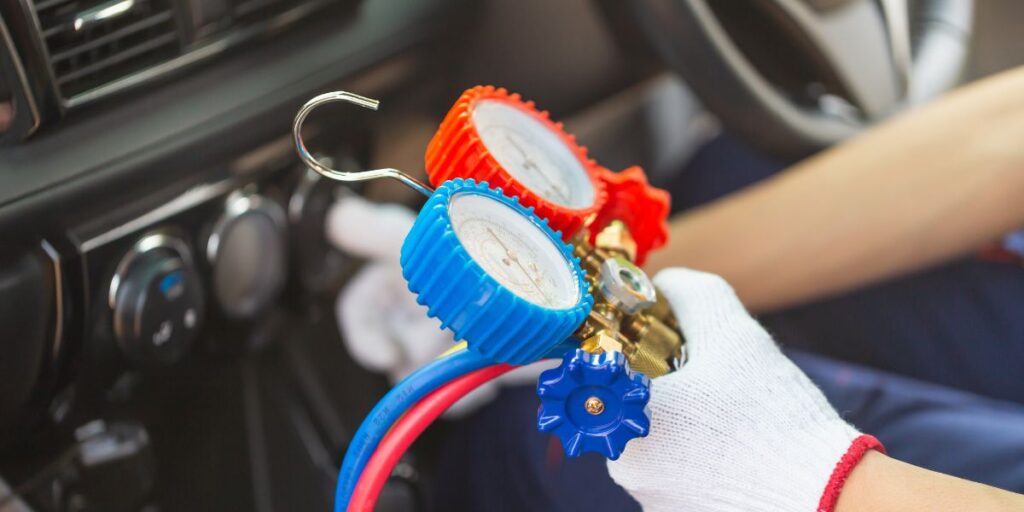Essential Tips for Cold Weather From A Trusted Mechanic Shop
April 2, 2024
As we approach the icy season, it’s crucial to prepare your car to meet the frigid weather head-on. Winterproofing your vehicle isn’t a mere ritual—it’s an absolute requirement for an effortless ride through the frigid weather. This guide unravels the key aspects of maintaining your car in top shape during winter. From halting icy intrusions to stressing the necessity for routine mechanic visits, we’ll walk through vital pointers for a hassle-free winter drive.
1. Give Your Battery Some TLC
Winter taxes your car’s battery with heavy demands, making it vital to keep it in optimal health. Inspect the battery’s age; a battery above three years fortifies the need for a check-up. Purge corrosion around terminals and affirm secure connections. Difficulty in igniting your car on a frosty dawn hints at a need for a battery replacement.
Taking care of your battery is essential for its longevity and performance. Regularly cleaning the battery terminals and ensuring they are free from corrosion can help improve its efficiency. Additionally, avoiding extreme temperatures and not overcharging the battery can also contribute to its overall health.
2. Antifreeze: The Unsung Hero
The silent savior of your car in winter is the antifreeze or coolant. Its role? Preventing the engine’s water from freezing. Regularly inspect the antifreeze quotient in your car, refilling when necessary. Remember, an ideal 50:50 ratio of antifreeze-to-water is key for shielding against freezing.
Antifreeze is an indispensable component safeguarding your vehicle’s smooth functioning, hindering engine coolant from icing up during the cold. This underestimated asset protects the engine from potential harm while bolstering its performance by overseeing temperature moderation. Additionally, antifreeze’s anti-corrosion ingredients and lubricating properties underscore its value in vehicle preservation.
3. Winter Tires: Your Cold-Weather Allies
Investing in a set of winter tires is like giving your car a cozy pair of winter boots. Winter tires provide better traction on icy roads and improve your vehicle’s handling. If you encounter heavy snowfall or icy conditions, winter tires are a game-changer.
Winter tires—specifically engineered for superior traction and handling in snow-clad and icy conditions—are your trusted allies. Their distinctive tread pattern and rubber blend retain flexibility amidst cold, enabling better road grip. Winter tires infuse a sense of safety and confidence while navigating winter landscapes.
4. Visibility is Key: Check Your Lights and Wipers
Diminished daylight during winter likely has you navigating in limited light scenarios. Confirm that your lights, embrace headlights, brake lights and indicators, are functioning aptly. Examine the wiper blades, replacing them in cases of smearing or inadequate windshield clearance.
Guaranteeing visibility is paramount for secure driving, especially under harsh weather conditions. Regular upkeep of your lights and wipers is key to maximizing line of sight on the roads. Impaired or dull headlights severely cut down your perceptibility, elevating the accident risk factor. Similarly, inefficient wipers can obstruct your view during rainfalls or snowstorms, complicating safe navigation. Hence, immediate inspection and fixing of flawed lights and wipers is crucial for driving visibility.
5. Oil Change: Opt for the Cold-Weather Blend
Consider switching to a winter-grade oil with a lower viscosity. This helps your engine start more easily in cold weather. Check your car’s owner’s manual for the manufacturer’s recommendations regarding the right oil for winter.
One important aspect of car maintenance is getting regular oil changes. When it comes to colder weather, it is recommended to opt for a cold-weather blend of oil. This type of oil is specifically formulated to perform better in low temperatures, ensuring that your engine stays properly lubricated even in freezing conditions. Additionally, the cold-weather blend helps prevent oil thickening, which can lead to poor engine performance and potential damage.
6. Keep Your Gas Tank Full
Running on a low tank in winter is a risky game. A full tank helps prevent moisture from forming in the gas lines and fuel tank. Plus, if you find yourself stranded or stuck in traffic, having ample fuel could be a real lifesaver.
Keeping your gas tank full is important for several reasons. Firstly, it helps to prevent condensation from forming inside the tank, which can lead to rust and other damage. Additionally, having a full tank of gas can be beneficial in emergency situations or during unexpected delays, ensuring that you have enough fuel to reach your destination or find the nearest gas station.
7. Emergency Kit: Prepare for the Unexpected
Winter’s unpredictability calls for smart preparation. Stock your vehicle with an emergency pack comprising essentials—a blanket, flashlight, spare batteries, jumper cables, a shovel, and some non-perishable nibbles. If stranded in the snow, a well-stocked winter survival kit will be your knight in shining armor.
Keeping an emergency kit handy is critical for unexpected scenarios or catastrophes. It should house vital necessities—non-perishable nourishment, water, a medical aid kit, flashlights, batteries, and a mobile charger. Don’t forget to routinely verify and replenish your kit to ensure all items are serviceable and unexpired.
8. Regular Visits to the Mechanic Shop: Your Car’s Winter Spa
Just as we visit the doctor for a health check-up, your car needs regular visits to the mechanic shop for a winter spa. A trained mechanic can inspect your car’s vital components, identify potential issues, and perform necessary maintenance tasks. From checking the brakes to examining the exhaust system, a mechanic ensures your car is in optimal condition to face the challenges of winter.
During the winter season, it is essential to schedule regular visits to the mechanic shop for your car’s maintenance. The harsh weather conditions can take a toll on various components of your vehicle, such as the battery, tires, and fluids. By having your car serviced regularly, you can ensure that it is in optimal condition and ready to tackle the challenges of winter driving. Additionally, mechanics can also inspect and address any potential issues that may arise due to cold temperatures or icy road conditions, providing you with peace of mind during this time of year.
Why Regular Visits to the Mechanic Shop Matter:
- Brake Inspection: Regular visits to the mechanic shop are crucial for brake inspection. Brake systems are a vital component of a vehicle’s safety, and regular inspections ensure that they are functioning properly. A skilled mechanic can identify any potential issues or worn-out brake pads, preventing accidents and costly repairs in the long run. Cold weather can affect brake performance. A mechanic will inspect the brakes, ensuring they are in top condition to handle winter road conditions.
- Battery Check: Regular visits to the mechanic shop also include battery checks, which are essential for maintaining a reliable vehicle. A skilled mechanic can assess the battery’s health and detect any signs of weakness or deterioration. This preventive measure helps prevent unexpected breakdowns and ensures that the vehicle starts smoothly, especially during cold weather when batteries tend to struggle. Additionally, a mechanic can provide guidance on proper battery maintenance and recommend replacements if necessary, saving the driver from potential inconveniences and expenses in the future. A mechanic can perform a thorough battery check, ensuring it has enough power to start your car in cold temperatures.
- Fluid Inspection: Another important task a mechanic can perform is fluid inspection. They will check the levels and condition of essential fluids such as engine oil, coolant, and brake fluid. This ensures that all fluids are at the proper levels and free from contaminants, which helps maintain the overall performance and longevity of the vehicle. Additionally, a mechanic can identify any leaks or potential issues with the fluid systems, allowing for timely repairs and preventing more significant problems down the road. From checking antifreeze levels to ensuring the transmission fluid is in good condition, a mechanic will inspect and top up essential fluids.
- Tire Inspection: In addition to fluid checks, a mechanic will also inspect the tires for proper inflation, tread wear, and any signs of damage. This is crucial for ensuring optimal traction, handling, and overall safety on the road. They may also rotate the tires if necessary to promote even wear and extend their lifespan. By addressing any tire issues during a regular inspection, potential blowouts or uneven wear can be prevented, saving the driver from costly repairs or accidents in the future. A mechanic can assess the condition of your tires, including tread depth and inflation, and recommend rotations if necessary.
- Exhaust System Check: Another important aspect of a regular inspection is checking the exhaust system. The mechanic will examine the exhaust pipes, muffler, and catalytic converter for any leaks, rust, or damage. A properly functioning exhaust system is essential for reducing emissions and ensuring the vehicle runs efficiently. Additionally, a thorough inspection can detect any potential issues that could lead to harmful fumes entering the cabin, protecting both the driver and passengers from exposure to toxic gases. Cold weather can accelerate wear on your exhaust system. A mechanic will inspect for leaks, ensuring your car’s emissions are within acceptable levels.
Conclusion: A Warm Winter Ride Awaits!
As the chilly embrace of winter descends, remember- a well-equipped vehicle is your finest ally on frozen roads. Be it winter tires or regular mechanic check-ups, every move accumulates for a safer, smoother drive. So, let’s gear up, heed these guidelines, and face the wintry scenes with poise. Your vehicle, and equally crucial, you, deserve a warm and stress-free winter journey. Trust Anthony’s Auto Service to completely winter proof your car!
Anthony's Auto Service
Recent Posts



